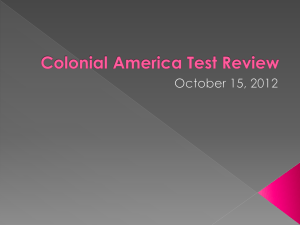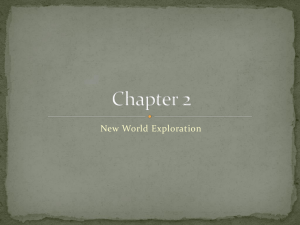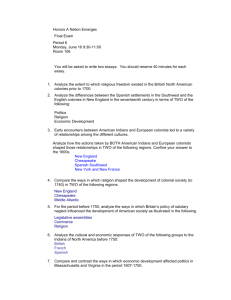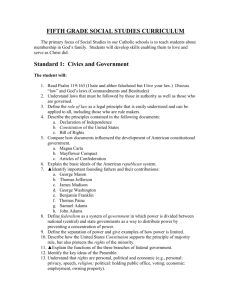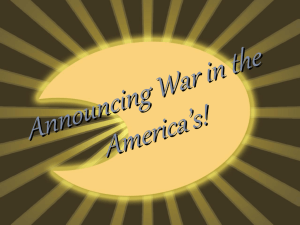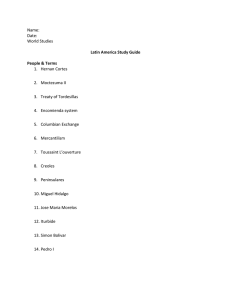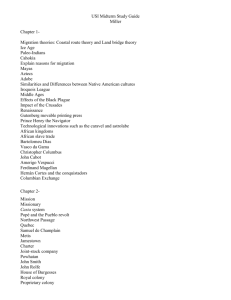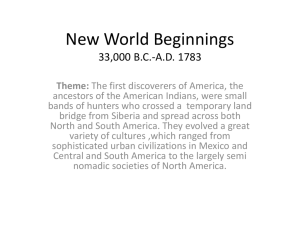Chapter 3 England Discovers its Colonies Empire, Liberty, and
advertisement
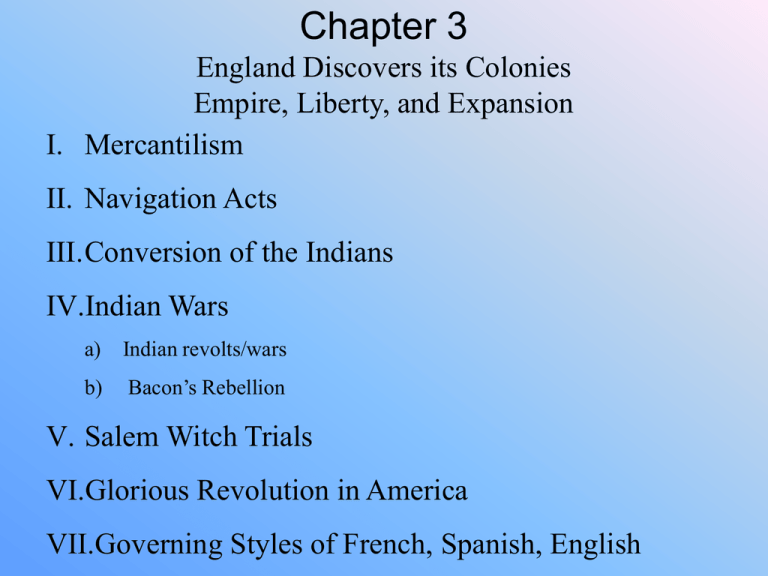
Chapter 3 England Discovers its Colonies Empire, Liberty, and Expansion I. Mercantilism II. Navigation Acts III.Conversion of the Indians IV.Indian Wars a) Indian revolts/wars b) Bacon’s Rebellion V. Salem Witch Trials VI.Glorious Revolution in America VII.Governing Styles of French, Spanish, English Chapter 3 England Discovers its Colonies Empire, Liberty, and Expansion I. Mercantilism What were the goals of mercantilists? Colony and mother country Why Mercantilism ? II. Navigation Acts - were a series laws which restricted the use of foreign shipping for trade between England and its colonies, which started in 1651. Instigated animus that will lead to revolution. The Navigation Act of 1651 - English trade should be carried in English vessels. Treaty of Westminster 1654 • The Navigation Act 1660 -ships' crews had to be threequarters English, and "enumerated" products not produced by the mother country, such as tobacco, cotton, and sugar were to be shipped from the colonies only to England or other English colonies. • The Navigation Act 1663 required all European goods bound for America (or other colonies) to be shipped through England or Wales first. • Treaty of Westminster 1674 • Colonists basically not pleased – responded unfavorably to these acts. • WHY? • Culpeper's Rebellion - 1677–79 III. Conversion of Indians 1st began in 1640 (MA) Not a one way street By 1670s – most of the Indians not killed off by disease, lived in what were described as PRAYING TOWNS Resistance to conversion created problems between Indian and White IV. Indian Wars - Different colonies dealt with tribes differently. No consistency. - Pennsylvania: - William Penn - Frame of Government 1682 - Algonquin and Sachem Tammany Indians - New England: Metacom’s War (King Philip’s War) 1675 – 1676 - disaster for Indians - proselytizing by Puritans (praying towns) - greed - Indians - humiliation 1675 Plymouth -arrested three Wampanoags and executed them Why might he be stealing? Indians assembled to request justice/satisfaction Settlers dismissed them War broke out -Virginia -Same time as King Phillips War Doegs Susquehannocks Governor Berkeley Nathaniel Bacon -1670s: Susquehannock people of Upper Potomac river in conflict with Virginia tobacco planters (Bacon is one) • Spanish - 1680 • • New Mexico area: Pueblo Indians: conflict, resistance Pueblo people harbored hostility toward the Spanish, primarily due to their denigration and prohibition of the traditional religion. • Labor, encomienda, mines • • 1670s – drought, Apache Brutal treatment by Spanish • Popé V. Salem Witch Trials • As busy as the colonists may have been with Indians, they were also wrapped up with fears of demons and devils – Salem in 17th century. VI. European Problems: 1680s - 1700 - Spain at war with France 1683. - League of Augsburg - King James II flees England - William and Mary - Declaration of Rights in England- 1689 - France at war with Britain – 1689 - 1697 – Treaty of Ryswick - French recognize William III as King VII. Glorious Revolution in America Concern over Catholic plots by Protestants in colonies Popish Plot? Titus Oates – 1678 – 1681 Exclusion Bill -Royal Declaration of Indulgence - Britain loses absolute control over colonies - Parliament takes control. - Civil liberties, charter of rights - Ideas that would develop into catalysts for American revolution - Rights of man from God, not government -Changes that came from the Glorious Revolution impacted colonists in 17th and 18th century (and 19th). -Republicanism -Science and technology Much changed during the revolution in England - less interest in the colonies - crown was not supreme power – rights from God, not crown - Greed is good. VIII. Governing Styles: French, Spanish French (Inclusive) Spanish (Inclusive~Exclusive) MISC TERMS / IDEAS Primogeniture – Entail – Toleration Acts 1689 in England? How was military service viewed by colonists? Who / What was/were the FIVE NATIONS? 17th century Philosophers – attitudes about government and positive legislation.
